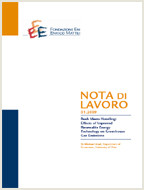Optimal Mechanisms for Heterogeneous Multi-cell Aquifers

02.02.2011
Stergios Athanassoglou, Glenn Sheriff, Tobias Siegfried, Woonghee Tim Huh
C6, D0
Common Property Resource, Differential Games, Groundwater Extraction, Imperfect Monitoring, Markov Perfect Equilibrium
Climate Change and Sustainable Development
Carlo Carraro
Standard economic models of groundwater management impose restrictive assumptions regarding perfect transmissivity (i.e., the aquifer behaves as a bathtub), no external effects of groundwater stocks, observability of individual extraction rates, and/or homogenous agents. In this article, we derive regulatory mechanisms for inducing the socially optimal extraction path in Markov perfect equilibrium for aquifers in which these assumptions do not hold. In spite of the complexity of the underlying system, we identify an interesting case in which a simple linear mechanism achieves the social optimum. To illustrate potential problems that can arise by erroneously imposing simplifying assumptions, we conduct a simulation based on data from the Indian state of Andhra Pradesh.
***
Suggested citation: Stergios Athanassoglou, Glenn Sheriff, Tobias Siegfried, Woonghee Tim Huh, Optimal Mechanisms for Heterogeneous Multi-Cell Aquifers, Environ Resource Econ (2012) 52:265–291, http://dx.doi.org/10.1007/s10640-011-9528-0
